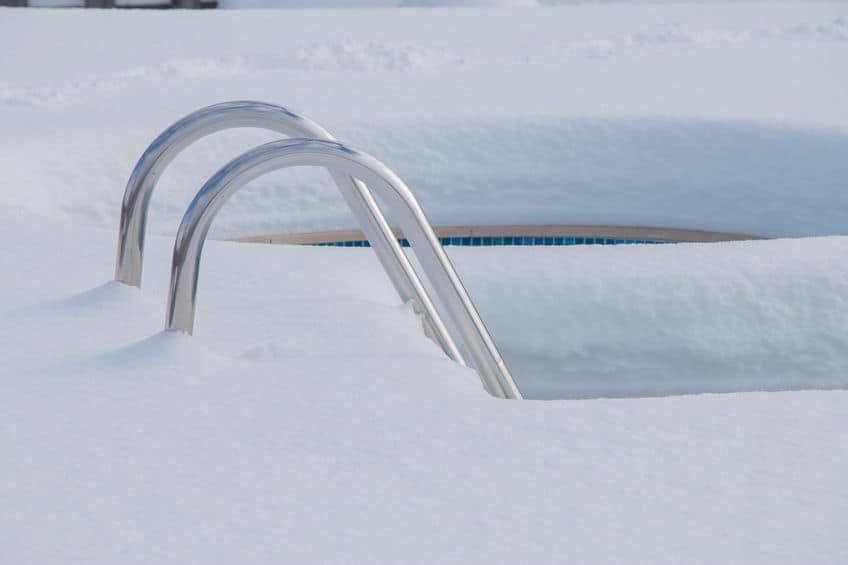Pool closing season is approaching and depending on where you live it might be coming up quicker than you think. As temperatures drop your pool usage will decrease as does chlorine production but correspondingly, your pool tends to get dirtier with leaves, twigs and other debris likely to enter the water.
A saltwater pool’s water freezes at around 28° F whereas a regularly chlorinated pool will freeze at around 32° F. A typical salt chlorinator system automatically slows down chlorine production once water temperature drops to about 60° F. At around 50° F chlorine production usually shuts off completely. It is difficult at this low temperature for the unit to convert salt to chlorine and you risk damaging the unit when it gets this cold.
Chlorine requirements drop as the temperature goes down and presumably you aren’t using the pool at the level either. Below 40° F, algae can’t grow so the need for chlorine at that point is minimal. Depending on where you live, the freezing of water may or not be a problem in winter but if it is, you need to ensure that that your pool is closed properly ahead of time to prevent damage over the cold winter months.
Ensure A Clear Pool In The Spring
If you want to avoid a pea green pool in the spring when you take off the winter pool cover, there are a few things you can do to prevent this from happening. First, try to delay closing your pool until the temperature is at least under 60° F consistently. Around this temperature, my Hayward AquaRite chlorinator system slows down chlorine production automatically since less chlorine is required as water temperature drops. But keeping the pool open and the pump and chlorinator running later in the season means continued chlorine production occurs which protects against algae.
Secondly, consider use of a preventive algaecide right around the time you close the pool. By pouring a bottle of it in the pool it will help to prevent algae over the winter especially if the temperature spikes after the pool is closed and the system is shut down.
Thirdly, super chlorinate or shock the pool with chemical chlorine at or just before closing. When our pool company closes our pool, they drop the water so that it is below the skimmer and return jets, flush out the lines and cap them, shut the entire system down and then dump a container of liquid chlorine throughout the pool. The amount will depend on the volume of your pool – taking into consideration that you just lowered the water level – and the strength of the chlorine.
This helps to keep the water highly chlorinated for at least awhile and given the low temperatures you get in winter, it should help to ensure clear water come spring time.

Conclusion
A salt water pool will freeze at around 28° F. I live in a winter zone that often gets far colder than that and while the top of the pool water freezes it certainly doesn’t freeze throughout the pool all the way to the bottom or anywhere close. I have a look at the pool throughout the winter and even in the skimmer it might be icy but it isn’t completely frozen.
Having said that you certainly do need to winterize your pool in this instance to make sure no long term damage is done from freezing pipes and equipment.

